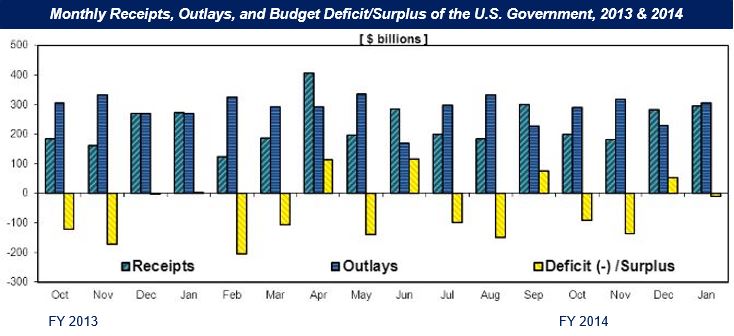The US budget deficit shrank in January, an indication that the country’s economy is gaining ground and government coffers are collecting more taxes.
In January 2014, the US federal government clocked up a deficit of $10.4 billion, according to data released by the Treasury Department.
According to a Reuters poll of analysts, a deficit of $27.5 billion had been expected.
The budget deficit for the October-January period was $184.02 billion, thirty-seven percent less than the $290.41 billion deficit during the same period a year earlier.
In the United States, the fiscal year starts on October 1st.
US government finances improve
National government finances have been steadily improving. Last year the federal budget deficit went below $1 trillion for the first time since 2009, as receipts were progressively boosted by higher tax rates.
The 2013 deficit of $680.28 was 32% lower than in 2012.
According to the Congressional Budget Office, the deficit for 2014 is expected to be about $514 billion, a 7-year record. However, other forecasts say that after 2015 the shortfall will widen again and may reach $1 trillion by 2022.
(Source: US Treasury Department)
Federal income rose, spending fell
Federal government receipts (revenue) increased by 8% to $960.60 billion during the first four months of this fiscal year. Most of the increase was from income taxes that were subjected to higher tax rates in 2013.
Federal government spending during the October-January period was $1.145 trillion, a decline of 3%.
With the threat of a debt ceiling crisis, brinksmanship and fears of government default fading, and the deficit shrinking in the short-term, economists say that the pressure in Washington for a major fiscal deal is off.
Market Watch quotes Loren Adler, research director at the Committee for a Responsible Federal Budget, who said “Recent deals have certainly put talks of a grand bargain on the back burner for now, even despite worsening fiscal projections from CBO.”
America should learn to pay its way
While many may cheer at month-after-month of lower federal budget shortfalls, they are still deficits and not break-evens or surpluses. In other words, each month the government debt, which is already astronomical, keeps getting bigger.
The really good news would be a sustained period of economic growth, which appears to be taking place at the moment, accompanied by a long period of federal budget surpluses, signaling that the country is not only able to expand, but also pay its way.

